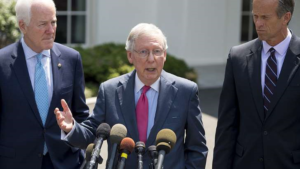
Oh, that Dan Patrick. He needs a lesson in Civics 101.
The Texas lieutenant governor has now laid blame for “all the problems” facing America at the feet of mayors, the vast majority of whom he says are Democrats. Oh, did I mention that Patrick is a Republican? There. I just did.
Patrick told Fox Business News that Democrats have made such a mess of municipal government that cities’ woes are spilling over into other walks of life. He said citizens are happy with governments at the state level. The cities? They’ve gone to hell, thanks to Democrats, according to the sometimes-bombastic lieutenant governor.
Shall we offer the lesson now? Sure, why not?
I’ll concede that there are pockets of municipal dysfunction around the country that have occurred under the watch of mayors elected as Democrats. Is that an exclusively Democratic problem? No. It is not. Republican-run cities have fiscal and crime issues with which they must deal, too. They have potholes that need to be filled and street signals that need to function properly.
What’s more, many thousands of mayors and city council members are elected on non-partisan ballots. Partisanship has no place in municipal governance. Cities with home-rule charters are governed by those who set aside partisan differences and who seek to set policies based on community interests, not based on whether they have positive or negative impacts on certain neighborhoods based on partisan affiliation or leaning.
I’m reminded at this moment of an Amarillo mayoral race some years ago in which a challenger to then-Mayor Kel Seliger called on all “good Republicans” to elect her instead of the incumbent. Mary Alice Brittain sent out pamphlets imploring GOP voters to turn out that spring to oust the mayor.
I was working at the time as editorial page editor of the Amarillo Globe-News and we reminded our readers to turn their backs on the ignorant rants of that challenger, given that Amarillo is one of most Texas cities governed by non-partisan mayors and city council members.
Seliger won re-election that year by a huge margin; Brittain disappeared and hasn’t been seen or heard from since.
Dan Patrick is entitled to espouse his partisan bias. I understand he’s a faithful Republican officeholder. He’s got a tough job running the Texas Senate, which is meeting at the moment with the House of Representatives in a special session of the Legislature.
But, c’mon Dan! Knock off the broad-brush blame game against local government officials who are doing their best to cope with the problems facing every city in America regardless of party affiliation.
As the Texas Tribune reports: But “the fact that city elections are nonpartisan is one of the greatest things about city government,” said Bennett Sandlin, executive director of the Texas Municipal League. “We like to say that potholes aren’t Democratic or Republican… it costs the same amount regardless of ideology.”
Patrick should know better. I fear he does not.









